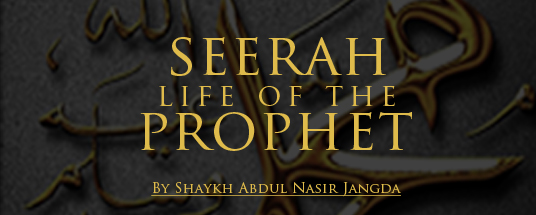9-12-2012
Episode 25: Salman al-Farsi, Amr bin Murrah al-Juhani & Prophecies About the Coming of Revelation
Welcome to Seerah Pearls, which aims to highlight some tantalising learning points from each episode of the Seerah- Life of the Prophet (sallallahu alayhi wasallam).
This episode continues with the story of Salman al-Farsi. Salman remained in slavery after accepting Islam- he had to miss the battles of Badr and Uhud. The Prophet (sallallahu alayhi wasallam) advised him to buy his freedom. Salman’s owner asked him to plant and grow 300 date palms, as well as for 40g of gold. Salman tried to negotiate him down to silver, but he insisted on gold. The owner knew the risks of his demands were high: transplanting trees had a high likelihood of failing. The Prophet (sallallahu alayhi wasallam) announced to the Sahaba to help their brother Salman. They started helping him by bringing date palms, ranging from 1-20 each in number. The Prophet (sallallahu alayhi wasallam) said to get the land ready and not to plant the trees, but to call him when they had dug the holes. He came and planted each of the 300 date palm individually with his own blessed hands. Miraculously, not even one tree died, and all 300 flourished. However, the gold was still required. The Prophet (sallallahu alayhi wasallam) had just recently been given a gift. Someone had found a gold mine and they chipped out a rock with gold and gifted it to him. He handed this over to Salman, who felt conscious of the debt he owed to the community. The Prophet (sallallahu alayhi wasallam) waived the debt, saying Allah would provide recompense. When Salman handed the block over to his owner, it was found to have exactly 40g gold. Thus, Salman obtained his freedom.
The first battle he participated in was the Battle of the Trench: he was the one to offer the novel strategy for the battle of digging the trench. During this endeavour, the Prophet (sallallahu alayhi wasallam) split the workers into groups of 10 based on family and tribe, so that the teams were familiar with each other and to aid cohesion. Salman did not have any alliances, but each of the Muhajiroun and Ansar argued that Salman belonged to their respective groups. The Prophet (sallallahu alayhi wasallam) settled the matter by saying that Salman belonged with him and his family.
Two stories are recounted about how some people are directly guided to Islam by extraordinary events by Allah’s decree. The first is the story of Amr bin Murrah al-Juhani. In the times of Jahiliyyah, he went to Makkah in the season of Hajj. Whilst sleeping, he awoke and saw a light shooting from the Ka’ba. Startled, he then heard a voice saying that the darkness was about to disappear, light was about to illuminate the earth, and that the final seal of the Prophets was about to be sent. A few nights later, he saw a similar light again, and heard a voice saying that Islam had become apparent and the idols had been broken. He told his people of this occurrence, but no one believed him. He came across a monk, and told him what had happened. The monk said that a man named Ahmed would be sent as a Prophet. Years later, when Amr came to Makkah, he heard people talking about someone who claimed to be a Prophet. He met the Prophet (sallallahu alayhi wasallam) and Amr accepted his call. Amr wanted to preach the message to his own people. The Prophet (sallallahu alayhi wasallam) advised him to be soft and gentle, and not to be harsh and arrogant. All of his people accepted Islam, except one. The Prophet (sallallahu alayhi wasallam) met all of them individually.
The second story is about Umar ibn Khattab (radiallahu anhu). Whilst he was Khalifah, a man walked into the Masjid. Umar (radiallahu anhu) called him and asked if he was Muslim: the man confirmed he was. He then asked if he used to be fortune teller. The man got offended, saying that since accepting Islam, no one had mentioned this. Umar (radiallahu anhu) reassured him that his intention was not to offend, but he wanted to see if the man remembered seeing a miraculous event, which he confirmed that he did. In the days of Jahiliyyah, Umar (radiallahu anhu) woke with a hangover near the place where the idols were kept. He observed a group of people who brought a goat to sacrifice to the idols. The goat was dead, but a voice came from it, saying that a new word had come, and the goat declared the Shahada.
Podcast: Play in new window | Download
Subscribe: RSS

